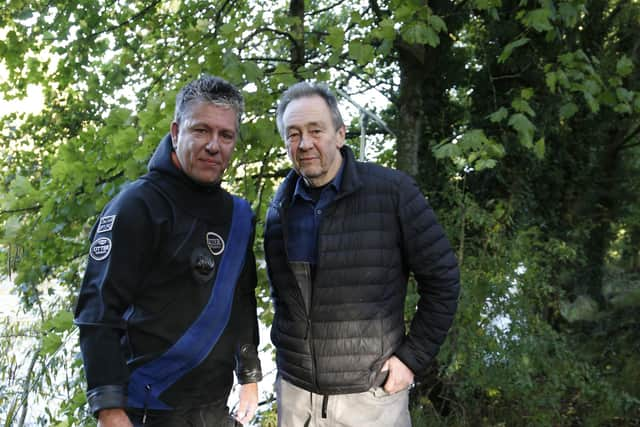Paul Whitehouse 'angry' with sewage pollution in Yorkshire river popular with swimmers
Presented by actor Paul Whitehouse, the show revealed that combined sewer overflows were used to discharge into the river and its tributaries for more than 13,000 hours in 2021.
During the documentary, water quality campaigner Mark Barrow pulled a clump of wet wipes and sanitary towels out of the river in Ilkley, before he showed footage of pieces of human waste floating in the water.
Advertisement
Hide AdAdvertisement
Hide AdHe also accused Yorkshire Water of discharging sewage into the River Wharfe on a regular basis, even though the discharges are only permitted when it needs to prevent its sewage network from becoming overwhelmed, following periods of heavy rain.


Yorkshire Water said it is installing a new sewer that will reduce the frequency and volume of discharges from the local combined sewer overflow. It is due to be operational in January 2024.
The company also said it has “a key role to play” in tackling pollution but “coordinated action is needed” from farmers, Bradford Council, businesses and local people.
During the documentary, Mr Whitehouse spoke from campaigners from Ilkley Clean River Group who claimed people have fallen ill after swimming in the river and children have been seen swimming in the outfall of the local sewage treatment works.
Advertisement
Hide AdAdvertisement
Hide AdHe said: “You can really understand why people get angry with the water companies. I’m getting angry with Yorkshire Water and I don’t even live in Yorkshire.
"The fact that they’re the ones actually causing the problem still plays with my mind.”
Part of the river in Ilkley became the first in the country to be granted bathing status in 2020, but the Environment Agency said last year that swimming is “not advised”, as it contains effluent from storm overflows and misconnected sewers, as well as runoff from livestock farms.
A Yorkshire Water spokeswoman said pollution of the county’s rivers “remains an issue that must be addressed by a range of agencies working together”.
Advertisement
Hide AdAdvertisement
Hide AdShe said: “Water companies have a key role to play, but coordinated action is needed by farmers, the local authority, businesses and local people with the ultimate aim of improving the bathing water classification.
“We continue to invest over and above existing investment plans in Ilkley and the surrounding area to make improvements in our network to reduce its impact on water quality.
“The second phase of work to construct a new sewer in the town to reduce the frequency and volume of discharges into the river Wharfe is underway and we have also completed an update to Rivadale combined sewer overflow to reduce the impact discharges have on water quality.
“Disinfection measures were in place at Grassington, Draughton and Beamsley wastewater treatment works throughout the bathing water season to improve water quality and our smart wastewater network pilot in the town is now underway.”
Advertisement
Hide AdAdvertisement
Hide AdShe added: “We continue to support and go beyond the government’s storm overflow reduction plan and we are already planning for our largest ever environmental investment programme between 2025 and 2030.”
Last summer, the Environment Agency stated Yorkshire Water’s environmental performance requires “significant improvement”, as it recorded 74 pollution incidents in 2021 and five were deemed to be serious.
Across the country, there were 62 serious pollution incidents – the highest total since 2013.
Water companies use around 15,000 overflows to discharge excess wastewater and rainwater during heavy storms, to prevent sewage systems from becoming overloaded and backing up into streets and homes.
Advertisement
Hide AdAdvertisement
Hide AdThat is because the original sewer system, designed by the Victorians, has one pipe for wastewater and rainwater.
The Government has published its storm overflow discharge reduction plan, which sets a number of strict targets for water companies and requires them to invest £56bn over 25 years on upgrading their infrastructure.
Offwatt, which regulates the water companies, said investment in the industry has roughly doubled since privatisation in 1989, and companies spent around £6bn a year on upgrading their infrastructure between 2015 and 2020.
But they also paid out £57bn in dividends to shareholders of parent companies between 1991 and 2019.